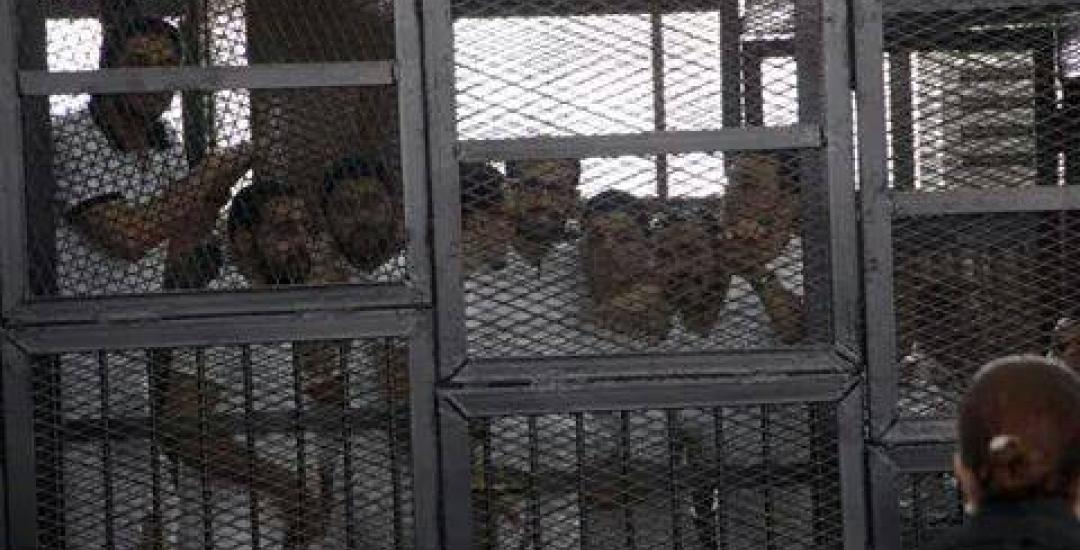
On 27 April 2017, Alkarama sent urgent appeals to the Special Rapporteur on freedom of expression (SRFRDX) and the Working Group on Arbitrary Detention (WGAD) concerning the case of ten individuals, including nine journalists prosecuted in the “Raba’a Operations Room” mass trial. In December 2015, their first sentence was quashed by the Court of Cassation and a new decision will be taken on 8 May 2017. We fear that the Court will confirm the sentences against the ten victims – life imprisonment for eight of them and death sentence for two others – who will have no further means to challenge the decision.
All ten victims are prosecuted in a case called the “Raba’a Operations Room” in reference to the violent dispersal of peaceful protesters who were organising a sit-in in the Raba’a Al Adawyya Square on 14 August 2013 against the military takeover. The indiscriminate use of fire bullets into the crowd of protesters caused the death of over 1150 peaceful protesters and was characterised as a crime against humanity by several organisations which investigated and documented the violations, including Alkarama.
The nine journalists – Abdullah Ahmed Mohammed Ismail Alfakharany, Samhy Mostafa Ahmed Abdulalim, Mohamed Mohamed Aladili, Waleed Abdulraoof Shalaby, Ahmed Sabii, Youssouf Talat Mahmoud Mahmoud Abdulkarim, Hani Salheddin, Abdo Dasouki and Mosaad Albarbary – were arrested between August 2013 and April 2014, after covering the events and interviewing witnesses and survivors of the violent dispersal. Despite the detailed investigations carried out by human rights organisations, the Egyptian authorities still deny the severe violations committed against protesters on the Raba’s square. Therefore, journalists who covered the events were charged with “disturbing peace”, “spreading false information” and “spreading chaos”. Furthermore, as the victims of the violent dispersal were mainly supporters of the Muslim Brotherhood, journalists and human rights activists who shed light on the violations were accused of “supporting the Muslim Brotherhood” and having formed “an operation room to the Muslim Brotherhood to defy the government” – i.e. the so-called “Raba’a Operations Room”.
On 19 May 2015 already, Alkarama had filed a complaint with the WGAD on behalf of the nine journalists, arguing that they had been arbitrarily arrested, prosecuted and sentenced to heavy penalties merely because they covered the Raba’s events and the mass killing of protesters as journalists. On 19 April 2016, the WGAD characterised their detention as arbitrary and called for their immediate release in Opinion No.7/2016. Still, to date, the authorities have refused to implement the WGAD Opinion and decided, instead of releasing them, to retry the journalists, under the same charges. All the journalist were sentenced to life imprisonment, except Shalabi who was sentenced to death.
“The Egyptian government must implement the UN decision and release the nine journalists as well as all those who were arrested for their legitimate and peaceful opposition and criticism of the authorities’ severe violations committed since the military takeover,” said Radidja Nemar, Regional Legal Officer for North Africa at Alkarama. “The upcoming decision of the Criminal Court is crucial and will show whether the Egyptian authorities are willing to put an end to these arbitrary detentions or whether they will carry on with the ruthless crackdown on all forms of peaceful dissent.”
Similarly, Abdelrehim Mohamed, a 53 year-old cardiologist, who also opposed the government’s crackdown, was arrested on 16 August 2013. He was charged in the same “Raba’a Operations Room” with vague charges such as “membership to and funding of the outlawed Muslim Brotherhood group”, “attempt to suspend the implementation of the Constitution” and “attempt to spread chaos in the country”. He was sentenced to death on 11 April 2015.
To date, all ten victims remain detained in appalling conditions, since they are kept in overcrowded cells without electricity or toilets, denied medical care and subjected to cruel, inhumane and degrading treatment – such as being beaten, stripped naked, put in solitary confinement, deprived of food, water, sleep, sunlight – on a regular basis.
In light of the above information, Alkarama solicited the SRFRDX and the WGAD’s urgent intervention with the Egyptian authorities to urge them to release all ten victims and implement WGAD Opinion No.7/2016. Alkarama further requested that Egypt, as a member of the Human Rights Council, be reminded to respect the fundamental human rights of its citizens and to end the practice of arbitrary arrest, detention and unfair trial targeting journalists and peaceful political opponents.
For more information or an interview, please contact media@alkarama.org (Dir: +41 22 734 1008).
